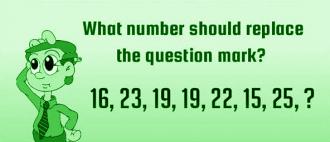What numbers should replace ...
What numbers should replace the question mark? (16, 23, 19, 19, 22, 15, 25, ?)Correct answers: 113
The first user who solved this task is Dave Edmonds.
#brainteasers #math #riddles

Two short jokes to get ready for Friday
My mate set me up on a blind date.
He said, "She's a lovely girl, but there's something you should know. She's expecting a baby."
I felt like a right idiot waiting in the pub wearing nothing but a nappy!
My fat wife and I were enjoying a swim in the hotel pool, when a little boy of about five got into trouble and appeared to be drowning.
Luckily, my wife was there to save his life...
She got out to inform the lifeguard and the water level dropped enough for him to stand up!

